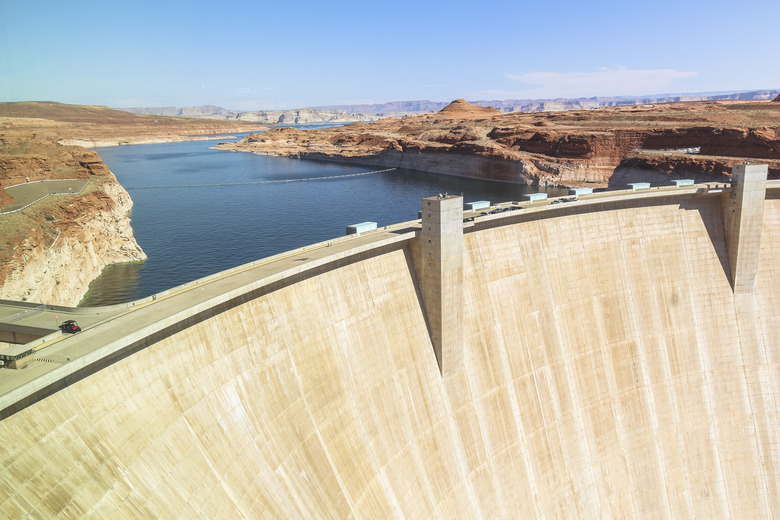Advantages & Disadvantages Of Constructing Dams
Man-made dams are designed to stop or impede the flow of water along a river. While dams are most commonly associated with the production of hydroelectric energy, they are used for a variety of purposes. When a river is dammed, it creates an artificial body of water behind the dam. Such reservoirs are used to supply the public with drinking water and for regulating the flow of water to surrounding areas.
Clean Energy
Clean Energy
Hydropower provides 19 percent of the world's supply of electricity, reports the U.S. Geological Survey, with approximately 3,000 terawatt-hours generated annually. Hydroelectricity harnesses the kinetic energy of water to move turbines, which in turn generate electricity. Hydropower is clean and renewable and reduces dependence on fossil fuels.
Regulates Water Supply
Regulates Water Supply
When a river is dammed, the water pools and forms a reservoir. This allows population centers to collect fresh water during periods of heavy rainfall for use during droughts and dry spells. Dams can also be used to control flood water and supply a regulated amount of water to surrounding areas for irrigation. Consequently, dams provide a buffer to extreme or irregular weather.
Floods Surrounding Areas
Floods Surrounding Areas
When a river is dammed, water is displaced and surrounding dry areas are flooded. Often this results in the displacement local populations and the inability to use land previously accessible. This can disrupt local activities like agriculture. Moreover, when vegetation is engulfed in water, the dead vegetation releases methane into the atmosphere, increasing the production of greenhouse gases. Additionally, the loss of forestland slows the uptake of carbon dioxide, another greenhouse gas.
Disrupts Ecosystems
Disrupts Ecosystems
The flooding of surrounding areas displaces existing wildlife and can disrupt whole ecosystems. Furthermore, marine life that relies on the unobstructed flow of the river, such as salmon and other migratory fish, can be adversely affected.
References
Cite This Article
MLA
Kwak, Patrick Stothers. "Advantages & Disadvantages Of Constructing Dams" sciencing.com, https://www.sciencing.com/advantages-disadvantages-constructing-dams-8379508/. 13 March 2018.
APA
Kwak, Patrick Stothers. (2018, March 13). Advantages & Disadvantages Of Constructing Dams. sciencing.com. Retrieved from https://www.sciencing.com/advantages-disadvantages-constructing-dams-8379508/
Chicago
Kwak, Patrick Stothers. Advantages & Disadvantages Of Constructing Dams last modified August 30, 2022. https://www.sciencing.com/advantages-disadvantages-constructing-dams-8379508/
